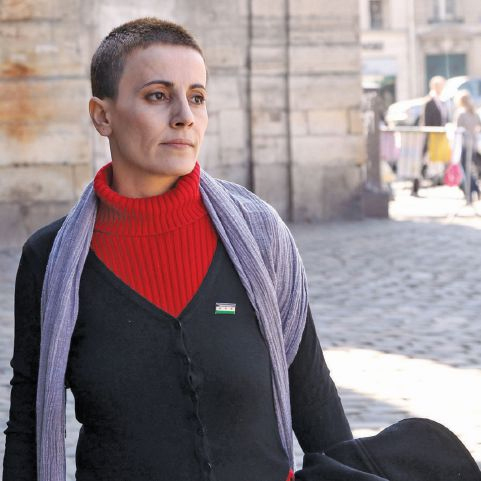Photographed by Jacques Demarthon of Agence France-Presse for Getty Images.
Of the many elegies for Fadwa Sulayman, those which associate the Syrian stage and TV actress’s death with the defeat of the Syrian revolution have proven the most heart-wrenching and painful. The pain stems not only from witnessing the anguish of many Syrians over the fate of their revolution, but also from the physical and the psychological torment the exiled Sulayman experienced when, her body riddled with cancer, she witnessed the hard-won victory slipping away.
Much has been contemporaneously written about Sulayman, especially prior to and during the early phase of the Syrian revolution, before her escape from the regime’s pursuit to Jordan and then to France in 2012, where she sought asylum. Although she maintained a presence in her homeland through Facebook, YouTube, and other dissident conventional media, Sulayman never returned to Syria, remaining in France until her death on August 17, 2017.
While still in Syria, the activist actress led protests and sit-ins against the Assad regime, attracting attention for her role as an unveiled activist in a predominantly religious and conservative society. A fierce critic of the regime, many regarded her as a unifying force for intellectuals and activists across the Syrian social and sectarian spectrum. Some went so far as to name her an “icon of the Syrian revolution,” a characterization which made her uncomfortable. Other factors, such as being an Alawite, the same sect as the Syrian president, brought Sulayman even more unwanted limelight.
Fadwa felt uncomfortable and unhappy with the stereotyping of Alawites for their unwavering support of the Assad regime, and would quickly point out that while some Alawite figures like Rami Makhlouf (a millionaire cousin of the Assads) appeared successful, the same could not be said for the rest of the Alawite population, who remain impoverished. Determined to fight the stereotype, the actress activist worked to convince the residents of Syrian cities with Alawite majorities in Lattakia and Tartus to join the peaceful protest movements against the regime.
Le Monde maintains that Fadwa had disavowed sectarian ties of her own, and therefore grounded her critiques in first-hand experience, rather than in her Alawite background. Still, even in her line of work, Sulayman bitterly acknowledged the importance of connections to the Assad regime. She laced her criticism of the regime with many accusations of corruption and cronyism. In a Skype interview with Reuters, she said, "Everywhere you go, even a theater or a film company, you feel you have entered a security branch… Authors write the worst scripts but they are chosen because they have links to security.”
As an activist, Sulayman faced both emotional challenges as well as physical, life-threatening ones. Common in tyrannical regimes, dictators often weaponize the families of dissidents, using them to pressure and silence protesting relatives. In Sulayman’s case, along with so many within the Alawite community, her entire family, including her brother Mahmoud, disowned her.
However, while Sulayman’s life as both an actress and activist figure has been well documented, many facets of her personal and professional life remained unknown until her recent passing. Beyond her life on-air, and her struggles as an anti-government figure, Sulayman also had an interest in poetry, which led Lebanese Al Hayat columnist Abduh Wazen to devote an entire column to Sulayman the poet. After moving to France, she published a poetry book entitled “When We Reach the Moon.” Additionally, in the famous Avignon theatrical festival, she presented a stage reading of her dramatic text entitled “The Crossing.” In the Living Voices Festival in Southern France, Sulayman read her poems and spoke of authentic and pure revolutionaries, as well as revolutions which had been aborted at the behest of fundamentalist and dictatorial regimes alike, as well as with the West’s complicity. In honoring her, the festival posthumously published a collection in Arabic and French entitled “In the Dazzling Darkness,” (Al Manar Publishing House, Paris).
More known for her roles as an actress and activist, Sulayman’s poetic life remained, for the most part, overlooked, “perhaps because Fadwa herself insisted on concealing her poetic talent behind the activist role,” according to Abduh Wazen. Sulayman’s poetry followed the traditions of many Syrian poets, speaking of longing, pain and tragedy rather than emulating the popular, fashionable revolutionary tradition. In her poetry, she conveyed her yearning to return to Damascus, often describing its “love, peace, bay plants and the jasmine flowers.”
As the “icon of the Syrian revolution,” Sulayman also inherited a distinct mindset and beliefs. She rejected sectarianism as an ideology and attitude, relying on reason and rationality. A Facebook post by Ali Atassi quotes her as saying:
“I have become, whether I wanted to or not, a symbol of the Alawite rebellious artist. As a result, I should pay attention to my behavior in public so I remain that symbol, which must not be distorted. I say to that friend, and others, that I am not an idol. The Syrian people, to my knowledge, continue tearing down idols. Thus, I am not such a hypocrite as to become a lifeless idol...and if you have transformed me into such a symbol in order to deprive me of my freedom let this symbol collapse and let freedom live. I am neither Alawite nor artist. I am, in fact, a rebel from birth, protesting against all decadent and outmoded values in my society. I rebel for freedom, for the people to become free in what they believe and like, as long as they find it a source of comfort, even if they worship a tree.”
This article appeared in Al Jadid Magazine, Vol. 21, No. 73, 2017.
Copyright © 2017 AL JADID MAGAZINE

